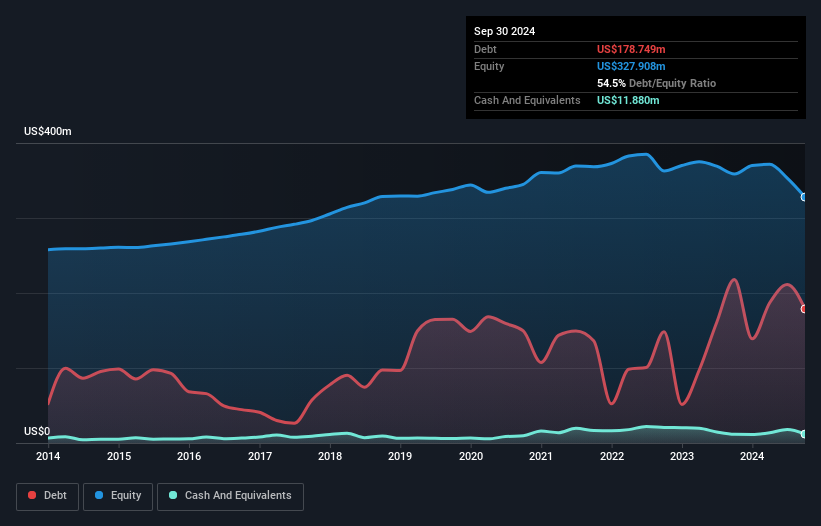
Warren Buffett famously said, 'Volatility is far from synonymous with risk.' It's only natural to consider a company's balance sheet when you examine how risky it is, since debt is often involved when a business collapses. As with many other companies American Vanguard Corporation (NYSE:AVD) makes use of debt. But should shareholders be worried about its use of debt?
When Is Debt A Problem?
Generally speaking, debt only becomes a real problem when a company can't easily pay it off, either by raising capital or with its own cash flow. If things get really bad, the lenders can take control of the business. While that is not too common, we often do see indebted companies permanently diluting shareholders because lenders force them to raise capital at a distressed price. Of course, debt can be an important tool in businesses, particularly capital heavy businesses. The first thing to do when considering how much debt a business uses is to look at its cash and debt together.
See our latest analysis for American Vanguard
How Much Debt Does American Vanguard Carry?
You can click the graphic below for the historical numbers, but it shows that American Vanguard had US$178.7m of debt in September 2024, down from US$218.0m, one year before. However, it does have US$11.9m in cash offsetting this, leading to net debt of about US$166.9m.

How Strong Is American Vanguard's Balance Sheet?
The latest balance sheet data shows that American Vanguard had liabilities of US$225.3m due within a year, and liabilities of US$206.2m falling due after that. Offsetting this, it had US$11.9m in cash and US$159.7m in receivables that were due within 12 months. So its liabilities total US$260.0m more than the combination of its cash and short-term receivables.
The deficiency here weighs heavily on the US$161.5m company itself, as if a child were struggling under the weight of an enormous back-pack full of books, his sports gear, and a trumpet. So we definitely think shareholders need to watch this one closely. At the end of the day, American Vanguard would probably need a major re-capitalization if its creditors were to demand repayment. The balance sheet is clearly the area to focus on when you are analysing debt. But it is future earnings, more than anything, that will determine American Vanguard's ability to maintain a healthy balance sheet going forward. So if you're focused on the future you can check out this free report showing analyst profit forecasts.
In the last year American Vanguard had a loss before interest and tax, and actually shrunk its revenue by 2.3%, to US$554m. We would much prefer see growth.
Caveat Emptor
Over the last twelve months American Vanguard produced an earnings before interest and tax (EBIT) loss. Indeed, it lost US$2.8m at the EBIT level. When we look at that alongside the significant liabilities, we're not particularly confident about the company. We'd want to see some strong near-term improvements before getting too interested in the stock. It's fair to say the loss of US$29m didn't encourage us either; we'd like to see a profit. In the meantime, we consider the stock to be risky. There's no doubt that we learn most about debt from the balance sheet. However, not all investment risk resides within the balance sheet - far from it. Be aware that American Vanguard is showing 2 warning signs in our investment analysis , you should know about...
If, after all that, you're more interested in a fast growing company with a rock-solid balance sheet, then check out our list of net cash growth stocks without delay.
New: Manage All Your Stock Portfolios in One Place
We've created the ultimate portfolio companion for stock investors, and it's free.
• Connect an unlimited number of Portfolios and see your total in one currency
• Be alerted to new Warning Signs or Risks via email or mobile
• Track the Fair Value of your stocks
Have feedback on this article? Concerned about the content? Get in touch with us directly. Alternatively, email editorial-team (at) simplywallst.com.
This article by Simply Wall St is general in nature. We provide commentary based on historical data and analyst forecasts only using an unbiased methodology and our articles are not intended to be financial advice. It does not constitute a recommendation to buy or sell any stock, and does not take account of your objectives, or your financial situation. We aim to bring you long-term focused analysis driven by fundamental data. Note that our analysis may not factor in the latest price-sensitive company announcements or qualitative material. Simply Wall St has no position in any stocks mentioned.
About NYSE:AVD
American Vanguard
Through its subsidiaries, develops, manufactures, and markets specialty chemicals for agricultural, commercial, and consumer uses in the United States and internationally.
Undervalued with moderate growth potential.
Similar Companies
Market Insights
Community Narratives


